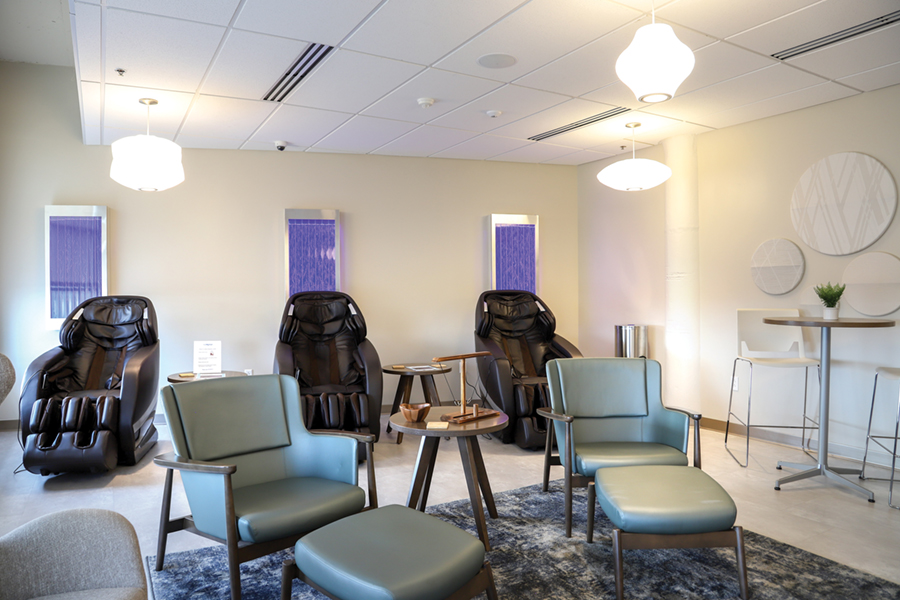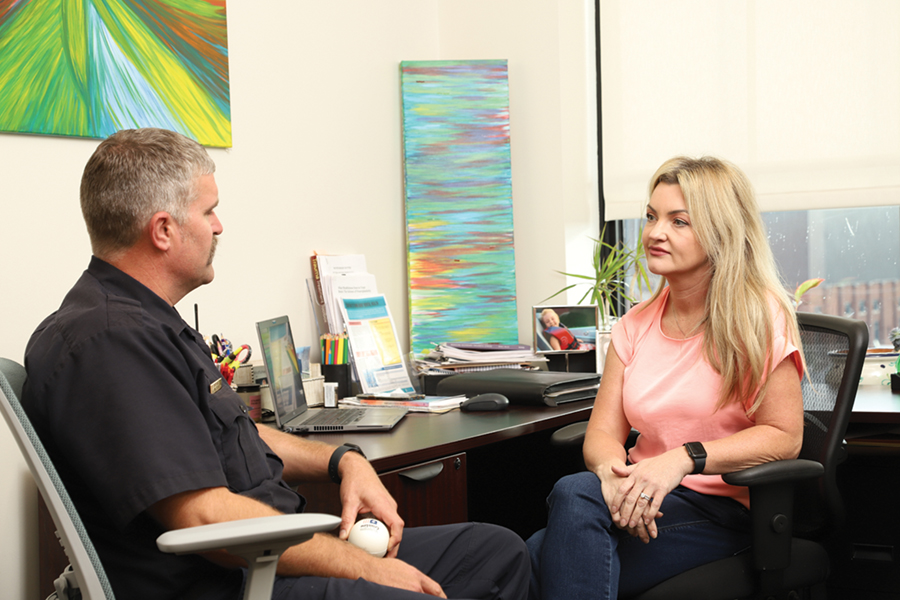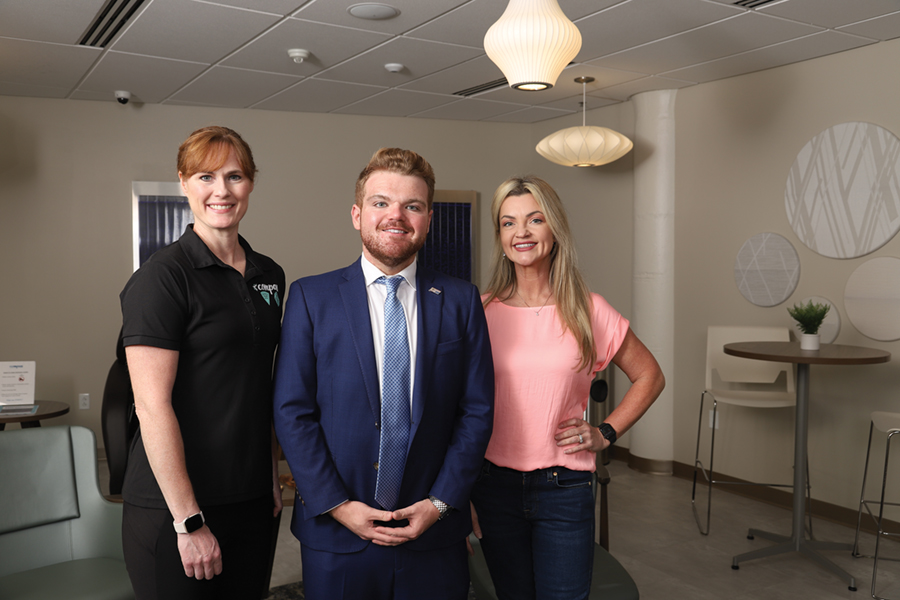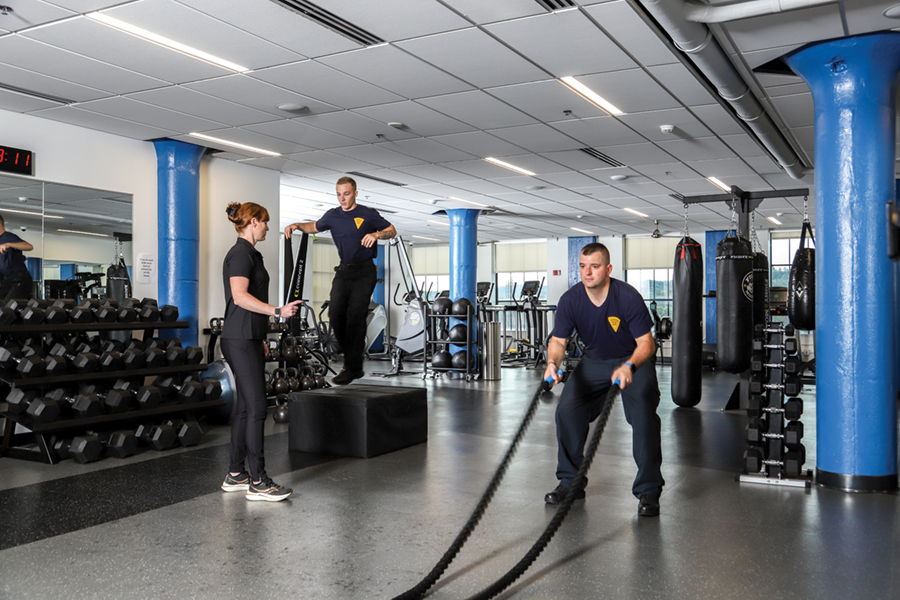The Compass program tends to the mental, physical and emotional health of Huntington’s first responders.
By Katherine Pyles
HQ 124 | WINTER 2024
The commitment to protect and serve can take an emotional toll. But in Huntington, a program known simply as Compass gives police officers and firefighters the support they need to cope with the trauma and stress of their work.
Compass began as a wellness program for police and fire personnel to address what’s known as “compassion fatigue” — burnout, essentially — caused by the opioid epidemic. Launched by Mayor Steve Williams in 2018 after Huntington was awarded a $1 million grant from the Bloomberg Philanthropies Mayors Challenge, the initial phase of the program employed a social worker and certified trainer to provide an outlet for first responders amid the skyrocketing opioid crisis.
It was a groundbreaking concept that earned Huntington its place among the eight other winners of the challenge, including much larger cities like Los Angeles and Philadelphia. With a strategic plan and grant funding in place, the Compass team got to work developing self-care, physical fitness and mental health tools that would help first responders deal with frequent overdose calls — aiming to improve not only their physical and mental strength in moments of crisis but also their emotional resilience to process repeated stressful encounters.
Then, COVID-19 hit. And for first responders, occupational stress and trauma only intensified. The pandemic became “a defining moment” for the Compass program, said Austin Sanders, chief innovation officer for the City of Huntington.

“When COVID-19 happened, it set back a lot of the other programs [in the challenge],” said Sanders, who joined the Compass program in 2020 as program manager and continues to oversee its operations as director of the Mayor’s Office of Innovation. “But COVID only amplified what we were trying to do.”
During the pandemic, Sanders said, first responders faced long working hours, inadequate rest and feelings of isolation and helplessness. Police officers were told to remain in their vehicles as much as possible and avoid booking people into jails to prevent spreading the virus. Meanwhile, the opioid crisis raged on, with an unprecedented increase in overdose deaths in 2020.
It made Compass’s mission all the more important, said Sanders, who oversaw the development of at-home wellness activities, virtual trainings and other creative initiatives that would sustain the program’s work. By the time the three-year Bloomberg grant ended, Compass had proved indispensable. Today, the program is funded by the City of Huntington, private donors and community partners.
In 2021, Compass celebrated the opening of the Compass Center, which houses a fully equipped gym, yoga studio, sauna and kitchen. The center is where Huntington’s first responders can participate in functional training to prevent injury, mental health coaching, mindfulness exercises and other wellness programming. Additionally, Compass serves as a liaison between police and fire personnel and outside clinicians, who specialize in everything from marriage counseling to general therapy, including EMDR therapy.

But this isn’t just about wellness, Sanders said.
“This is an opportunity for us to invest in the most valuable asset we as a community have: the men and women that wear the uniform of our city,” he said. “Just as we want our firefighters to have the best firetrucks and turnout gear, just as we want our police officers to have the safest cruisers and ballistics vests, we also want them to have the skills and resources to minimize the impact that their job has on them when they go home at the end of the shift.”

The Compass program is being replicated nationwide, from small municipalities to major metropolitan areas: recently, the Louisville Metro Police Department opened its own wellness center modeled after the Compass Center. Compass is also being adapted to other fields susceptible to burnout, like nursing and social work.
“Compass taught us one thing: it’s possible,” said Sanders, who’s currently working with hospitals throughout Ohio to help them apply the Compass model to their wellness programs for health care workers. “It’s possible for Huntington to be the model that other cities want to replicate.”

There’s a financial benefit to the Compass concept, Sanders noted, as decreasing turnover saves on recruitment and training costs.
As for Sanders, a West Virginia native who previously worked for the U.S. Senate and the West Virginia Legislature, the program has been instrumental in his own mental health journey.
“There has always been a stigma with respect to mental health,” he said. “But hearing police officers and firefighters talk about the struggles they’ve faced has helped me realize that I shouldn’t be ashamed of the struggles in my life either.”

It’s also fostered “a profound appreciation” for the dedication and sacrifice of Huntington’s first responders, he said.
“If people in our community could see just a glimpse of the type of people we have working for our citizens on a daily basis, I’d be hard-pressed to find anyone who wouldn’t hold their head up with pride,” he said.





